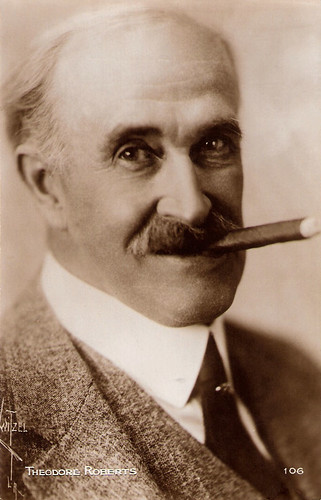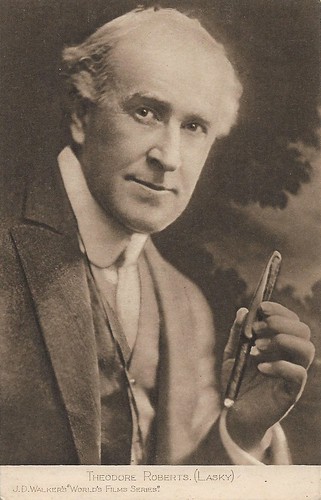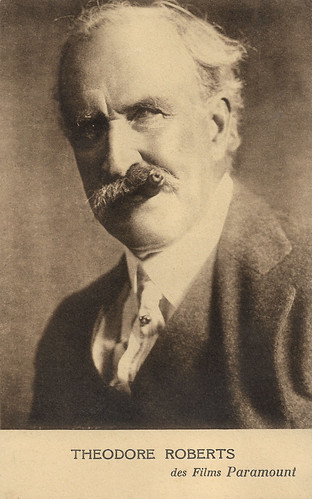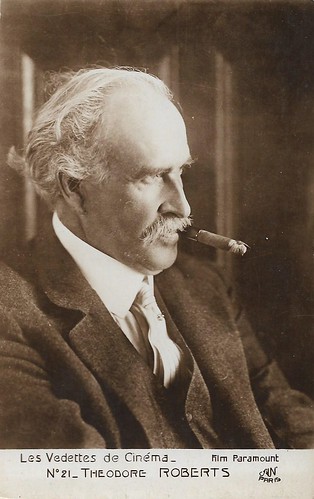Theodore Roberts (1861–1928) was an American stage and screen actor, who is known for his many parts in films by Cecil B. DeMille and his brother William DeMille. He was often referred to as the 'Grand Duke of Hollywood'.

French postcard by Cinémagazine-Edition, no. 106. Photo: Albert Witzel, Los Angeles.
Theodore Roberts was born in 1861 in San Francisco, California, USA, as the son of a sea captain, Martin Rickard Roberts, and Mary Elisabeth Nowlin. He was a cousin of the stage actress Florence Roberts.
Roberts made his first appearance on stage in 1880. In the 1890s he acted with Fanny Davenport in her play Gismonda (1894) and later in The Bird of Paradise (1912) with actress Laurette Taylor.
In 1914 he made his film debut in the silent adventure-drama Call of the North (Oscar Apfel, Cecil B. deMille, 1914). It is based on a novel, The Conjuror's House; a Romance of the Free Forest by Stewart Edward White and its 1908 play adaptation The Call of the North by George Broadhurst. Robert Edeson starred in the play and reprised his role in this film.
Roberts became a regular on the Cecil B. DeMille team and appeared in 23 of DeMille's films, such as Joan the Woman (1916) with Geraldine Farrar, The Squaw Man (1918) with Elliott Dexter, Don't Change Your Husband (1919) with Gloria Swanson and Dexter, Male and Female (1919) with Swanson and Thomas Meighan, and The Affairs of Anatol (1921) with Swanson and Wallace Reid.
Roberts also acted in films by William DeMille, such as Miss Lulu Bett (1921) starring Lois Wilson, and Grumpy (1923), in which he played the title character.

British postcard in J.D. Walker's "World's Film Series". Photo: Lasky.

French postcard by Edition Paramount, Paris. Photo: Paramount.
Theodore Roberts is best remembered for his role as Moses in Cecil B. DeMille's silent version of the epic The Ten Commandments (1923).
The religious, epic film, written by Jeanie MacPherson, is divided into two parts: a prologue recreating the biblical story of the Exodus and a modern story concerning two brothers and their respective views of the Ten Commandments.
Lauded for its "immense and stupendous" scenes, use of Technicolor process, and parting of the Red Sea sequence, the expensive film proved to be a box-office hit upon release. It is the first in DeMille's biblical trilogy, followed by The King of Kings (Cecil B. DeMille, 1927) and The Sign of the Cross (Cecil B. DeMille, 1932).
Despite the success of the film, Roberts played in less films after 1923, until the end of the silent era. His final film was the silent romantic dram Locked Doors (William C. deMille, 1925) starring Betty Compson. The film is considered lost.
In 1928, Theodore Roberts died from uremic poisoning in Hollywood. He was 67. A well-known and well-loved actor, Roberts' funeral in Westlake Park was attended by nearly 2,000 people.
However, Roberts felt so much bitterness in his heart for his immediate relatives that he bequeathed his estate to a nephew (a commercial illustrator) in New York. The estate was valued at nearly $20,000, including a yacht valued at $10,000.
Several of Roberts' personal items were left to his friends William C. de Mille and his brother Cecil. Roberts claimed that during the worst times of his life, no one in his family offered a word of sympathy or any help at all. His only request was that he be laid to rest next to his beloved wife, actress Florence Smythe, who had passed away in 1925.

French postcard by A.N. Paris, in the Les Vedettes de Cinéma series, no. 21. Photo: Paramount.
Source: Wikipedia and IMDb.

French postcard by Cinémagazine-Edition, no. 106. Photo: Albert Witzel, Los Angeles.
Grumpy
Theodore Roberts was born in 1861 in San Francisco, California, USA, as the son of a sea captain, Martin Rickard Roberts, and Mary Elisabeth Nowlin. He was a cousin of the stage actress Florence Roberts.
Roberts made his first appearance on stage in 1880. In the 1890s he acted with Fanny Davenport in her play Gismonda (1894) and later in The Bird of Paradise (1912) with actress Laurette Taylor.
In 1914 he made his film debut in the silent adventure-drama Call of the North (Oscar Apfel, Cecil B. deMille, 1914). It is based on a novel, The Conjuror's House; a Romance of the Free Forest by Stewart Edward White and its 1908 play adaptation The Call of the North by George Broadhurst. Robert Edeson starred in the play and reprised his role in this film.
Roberts became a regular on the Cecil B. DeMille team and appeared in 23 of DeMille's films, such as Joan the Woman (1916) with Geraldine Farrar, The Squaw Man (1918) with Elliott Dexter, Don't Change Your Husband (1919) with Gloria Swanson and Dexter, Male and Female (1919) with Swanson and Thomas Meighan, and The Affairs of Anatol (1921) with Swanson and Wallace Reid.
Roberts also acted in films by William DeMille, such as Miss Lulu Bett (1921) starring Lois Wilson, and Grumpy (1923), in which he played the title character.

British postcard in J.D. Walker's "World's Film Series". Photo: Lasky.

French postcard by Edition Paramount, Paris. Photo: Paramount.
Bitterness in his heart
Theodore Roberts is best remembered for his role as Moses in Cecil B. DeMille's silent version of the epic The Ten Commandments (1923).
The religious, epic film, written by Jeanie MacPherson, is divided into two parts: a prologue recreating the biblical story of the Exodus and a modern story concerning two brothers and their respective views of the Ten Commandments.
Lauded for its "immense and stupendous" scenes, use of Technicolor process, and parting of the Red Sea sequence, the expensive film proved to be a box-office hit upon release. It is the first in DeMille's biblical trilogy, followed by The King of Kings (Cecil B. DeMille, 1927) and The Sign of the Cross (Cecil B. DeMille, 1932).
Despite the success of the film, Roberts played in less films after 1923, until the end of the silent era. His final film was the silent romantic dram Locked Doors (William C. deMille, 1925) starring Betty Compson. The film is considered lost.
In 1928, Theodore Roberts died from uremic poisoning in Hollywood. He was 67. A well-known and well-loved actor, Roberts' funeral in Westlake Park was attended by nearly 2,000 people.
However, Roberts felt so much bitterness in his heart for his immediate relatives that he bequeathed his estate to a nephew (a commercial illustrator) in New York. The estate was valued at nearly $20,000, including a yacht valued at $10,000.
Several of Roberts' personal items were left to his friends William C. de Mille and his brother Cecil. Roberts claimed that during the worst times of his life, no one in his family offered a word of sympathy or any help at all. His only request was that he be laid to rest next to his beloved wife, actress Florence Smythe, who had passed away in 1925.

French postcard by A.N. Paris, in the Les Vedettes de Cinéma series, no. 21. Photo: Paramount.
Source: Wikipedia and IMDb.
No comments:
Post a Comment